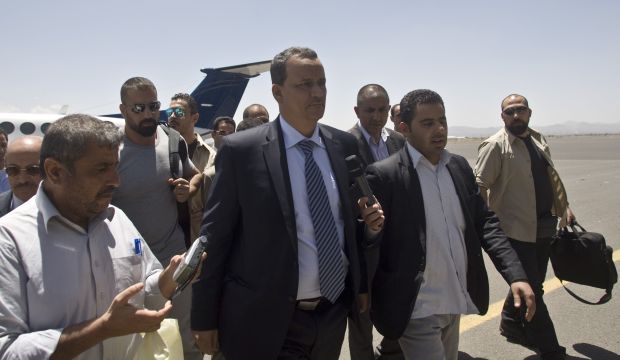
Ismail Weld al-Sheikh, new UN special envoy to Yemen, center, arrives at the international airport in Sanaa, Yemen, Tuesday, May 12, 2015. (AP Photo/Hani Mohammed)
Riyadh, Asharq Al-Awsat—The Gulf-sponsored talks on Yemen, set to begin in the Saudi capital Riyadh on Sunday, will be followed by a second round of meetings to monitor the implementation of its outcomes, Asharq Al-Awsat has learnt.
According to the conference’s draft agenda, which Asharq Al-Awsat obtained a copy of, Yemen’s political factions participating in the three-day talks will confirm their absolute support for legitimate President Abd Rabbuh Mansur Hadi and denounce the Houthi coup against his government.
Saudi Arabia has called on political factions in Yemen to attend the reconciliation talks to be hosted under the sponsorship of the Gulf Cooperation Council (GCC) with the aim of ending the political crisis gripping its southern neighbor.
The Houthi movement and military units loyal to ex-president Ali Abdullah Saleh remain opposed to the talks, demanding that they be hosted by a country other than Saudi Arabia and sponsored by the UN. A previous round of UN-sponsored talks failed to resolve the Yemen crisis that saw Houthis gain the upper hand and Hadi flee to Saudi Arabia.
Speaking to Asharq Al-Awsat on the condition of anonymity a Yemen official said: “The Houthis and Saleh’s followers are casting themselves as the main faction in Yemen to the new UN envoy to Yemen [Ismail Ould Cheikh Ahmed], claiming that they are still in control of Yemen’s territory, which shows that they do not want to abide by the UN resolution [2216] or the Gulf initiative.”
Following the wave of popular protests that swept Yemen in 2011, the GCC states proposed an initiative that saw the then-president Saleh step down in favor of his deputy Hadi.
The Riyadh conference will call for the hosting of another session, dubbed Riyadh II, to follow up on the implementation of the outcomes of Riyadh I.
The meeting will demand that all prisoners currently being held by the Houthi rebel group be released immediately. Hadi’s Defense Minister Mahmoud Al-Subaihi and political security chief and brother Nasser Mansur Hadi are among the detainees.
Meanwhile, the UN envoy to Yemen left Sana’a on Thursday, wrapping up a two-day visit during which he met with several political factions, including the powerful Houthi group and the Saleh-led General People’s Congress Party (GPC).
The Mauritanian diplomat has failed to produce any positive outcomes, a Sana’a source told Asharq Al-Awsat.
Ould Cheikh’s tour focused on two key issues, the humanitarian situation in Yemen and achieving a political settlement between rivals, according to the official.
The UN envoy urged all sides to “strictly respect a cessation of military operations . . . to allow the flow of aid,” and to spare infrastructure necessary for the smooth delivery of humanitarian aid to civilians.
While a truce between the Houthis and coalition forces held broadly in Yemen, clashes between the Shi’ite rebels and pro-Hadi volunteers continued over the past two days, prompting mass displacement of civilians in Sana’a and the country’s second city of Taiz.
Arafat Madabish contributed reporting from Sana’a.
